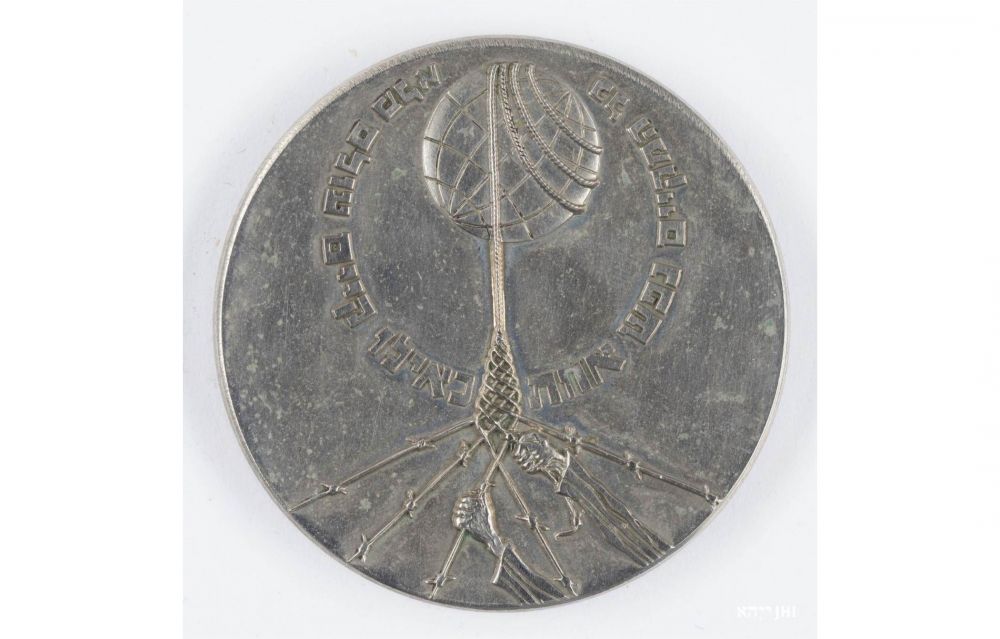- News
- Events
- Oneg Shabbat
- Collections
- Research
- Exhibitions
- Education
- Publishing Department
- Genealogy
- About the Institute
- Bookstore


Medal of the Righteous Among the Nations. JHI Collections
“It turned out later that the warning and help from Romańska came literally at the last moment, because less than an hour later, the Germans surrounded the ghetto and on that day they transported all Jews from Radziechów to the Pokaczew forests [actually Pukaczow – ed.], where they were murdered” – recalled Izydor Zwerling.
“Before the final deportation of Jews from Radziechów, the manager of the local bakery, a certain Mr. Cybulski, asked me and my friend – the late citizen Jaśkiewicz – to hide at his home citizen Zwerling Izydor, who worked in this bakery. After mutual agreement, Józefa Jaśkiewicz and I agreed to this request, because people of Jewish nationality were then in a hopeless situation and, without the help of Poles, were doomed to a certain extermination” – wrote Celina Romańska from Pyskowice in a statement submitted in 1964 to the JHI Archives. Radziechów is a town, currently in the Lviv region of Ukraine, which belonged to Poland before the war. Romańska was a primary school teacher, and Jaśkiewicz – a tailor.
![zwerling_relacja_ostatnia_strona_zw_1.jpg [492.99 KB]](https://www.jhi.pl/storage/image/core_files/2022/3/4/ba3da960e8c3c5f69c720b4ca8fb399b/jpg/jhi/preview/zwerling_relacja_ostatnia_strona_zw_1.jpg)
The last page of Izydor Zwerling's account. JHI Collections
“In the house where I lived, there was a hideaway under the floor, which served citizen Zwerling for shelter. Between me and Józefa Jaśkiewicz we have arranged a division of activities related to the hiding of Zwerling in such a way that Jaśkiewicz, working professionally as a tailor, obtained funds for living, while I ran a household, tried to get food and made sure that Zwerling was not found out by anyone unauthorized. I was also collecting information about the intended actions of the Germans so as not to be surprised by the unexpected invasion of the Germans”.
“In order to catch hiding Jews, the Germans organized a commission inspection of the apartments and checked the number of inhabitants. (...) One time they allegedly came to us to look for their friends. Citizen Zwerling was in the kitchen at the time, eating. Literally at the last moment, he jumped into the attic and hid there, and we were numb with terror”.
Izydor Zwerling was in hiding with the help of Polish women from November 1942 until the Red Army entered the area in July 1944. Both women paid for saving Zwerling’s life with serious health problems associated with living in constant fear. Józefa Pawłucka née Jaśkiewicz died prematurely in 1958 after a long illness, and Celina Romańska had to take a pension.
We know the history of Zwerling’s survival largely thanks to the accounts and statements written by him and his rescuers and deposited at the Archive of the Jewish Historical Institute. They became the basis for the process of awarding the title of the Righteous.
“I owe my life to these heroic women, Celina Romańska and Józefa Pawłucka (Jaśkiewicz). These women, guided by humanism to save my life, risked their own lives selflessly” – wrote Zwerling.
Read the reports on the DELET portal (Polish language only):
The accounts of Celina Romańska and Izydor Zwerling (sources of quotes in the article)
A statement by Celina Romańska and Józefa Pawłucka
The second account of Izydor Zwerling
Celina Romańska’s address from 1964:
Romańska Celina
Pyskowice powiat Gliwice
2a Traugutta Street
Dom Nauczyciela
Celina Romańska’s address from 1958:
Gliwice, 20/2 Brzozowa Street
Józefa Pawłucka’s address from 1958:
Wrocław, 2/2 Zegadłowicza Street
_____
On March 6, we celebrate the European Day of the Righteous, honoring the people who opposed totalitarian regimes in the 20th and 21st centuries.
At the JHI, we especially remember the Righteous Among the Nations, that is, those who saved Jews in Nazi-occupied Europe. The Jewish Historical Institute helped to recognize the achievements of many of those honored by the Yad Vashem Institute. According to YV, in 2021, among the 27,921 Righteous, there were as many as 7,177 people from Poland – more than from any other country.
_____
The quotes in the article come from the accounts from the Archives of the Jewish Historical Institute. Spelling and punctuation was corrected.